

"Introduction to The Zeitgeist Movement" [Part 1 of 11] The unstoppable rise of a collaborative economy: Shane Hughes at TEDxLausanne. The Cheapest Generation - Derek Thompson and Jordan Weissmann. In 2009, Ford brought its new supermini, the Fiesta, over from Europe in a brave attempt to attract the attention of young Americans.

It passed out 100 of the cars to influential bloggers for a free six-month test-drive, with just one condition: document your experience online, whether you love the Fiesta or hate it. Young bloggers loved the car. Young drivers? The cash-strapped millennials using 'sharing economy' Thursdays, 8pm on ABC1. Money Debt, & RBE [ The Zeitgeist Movement ] Peter Joseph on Joe Rogan Live January 6 2012. Zeitgeist Versus the Market - Peter Joseph Debates Stefan Molyneux. "History of Economic Thought" [Part 2 of 11] Zeitgeist Day 2013: Ben McLeish.
Z-Day 2013 Vancouver Virtual Online Event. Exclusive Interview with Peter Joseph. Peter Joseph, Zeitgeist Movement Founder on TYT. Sue Everatt talk at TEDx about The Venus Project and RBE. Jacque Fresco: US has never been a democracy. Neurological Relativism and Time-binding. Jacque Fresco on the problem of superstitious ignorance. Strange Beliefs: Sir Edward Evans-Pritchard.
Neurological Relativism. By Robert Anton Wilson (Originally published in the March 1978 issue of New Libertarian, p.8)
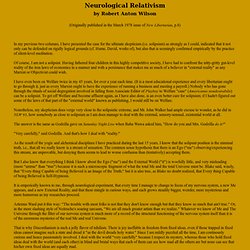
Episode #1 "What Democracy?" by Peter Joseph. Episode #2 "Economics 101" by Peter Joseph. Episode #3 "C.V.D." by Peter Joseph. Culture In Decline - Episode 4 (HD) (by Peter Joseph) Episode #5 "Baby Go Boom!" by Peter Joseph. Episode #6 "Tale of Two Worlds" by Peter Joseph. Policy-based evidence making. Evidence-based policy making is a theoretical construct whereby political policy is based on sound scientific evidence.
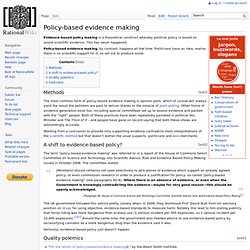
This has never happened. Policy-based evidence making, by contrast, happens all the time. Politicians have an idea, realise there is no scientific support for it, so set out to produce some. [edit] Methods The most common form of policy-based evidence making is opinion polls, which of course will always yield the result the pollsters are paid to deliver thanks to the miracle of push polling. Part 1. The North American Technate TNAT Technocracy. Part 2. The North American Technate TNAT Technocracy. Part 3. TNAT information Technate Design. Brian Cox: MPs who ignore science should 'explain why'
Buckminster Fuller - Thinking Out Loud (1996) The%20Life%20Cycle%20of%20Empires%20and%20America%20040904%202nd%20draft%2008. *[Remastered] Robert Anton Wilson - The Acceleration of Knowledge. Generational Cycles & the Upcoming Crisis. 1984 vs. 2013: Why Privacy Matters. In the 21st century surveillance state, we are all terrorists. August 20, 2013, 11:58 AM — U.S. journalist Glenn Greenwald (L) walks with his partner David Miranda in Rio de Janeiro's International Airport August 19, 2013.
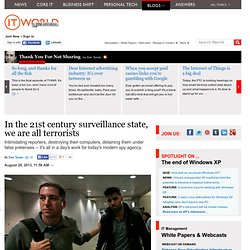
British authorities used anti-terrorism powers on Sunday to detain Miranda, the partner of Greenwald, who has close links to Edward Snowden, the former U.S. spy agency contractor who has been granted asylum by Russia, as he passed through London's Heathrow airport. The 28-year-old Miranda, a Brazilian citizen and partner of Greenwald who writes for Britain's Guardian newspaper, was questioned for nine hours before being released without charge, a report on the Guardian website said.
Detaining my partner: a failed attempt at intimidation. At 6:30 am this morning my time - 5:30 am on the East Coast of the US - I received a telephone call from someone who identified himself as a "security official at Heathrow airport.
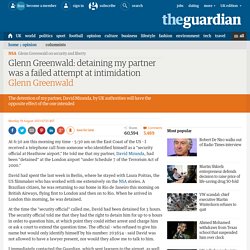
" He told me that my partner, David Miranda, had been "detained" at the London airport "under Schedule 7 of the Terrorism Act of 2000. " David had spent the last week in Berlin, where he stayed with Laura Poitras, the US filmmaker who has worked with me extensively on the NSA stories. They Know Much More Than You Think by James Bamford.
The headquarters of the National Security Agency, Fort Meade, Maryland In mid-May, Edward Snowden, an American in his late twenties, walked through the onyx entrance of the Mira Hotel on Nathan Road in Hong Kong and checked in. He was pulling a small black travel bag and had a number of laptop cases draped over his shoulders. Inside those cases were four computers packed with some of his country’s most closely held secrets. Within days of Snowden’s documents appearing in The Guardian and The Washington Post , revealing several of the National Security Agency’s extensive domestic surveillance programs, bookstores reported a sudden spike in the sales of George Orwell’s classic dystopian novel 1984 . On Amazon.com, the book made the “Movers & Shakers” list and skyrocketed 6,021 percent in a single day. Response to 'Anarchy is Silly'
Primitive human society 'not driven by war' 18 July 2013Last updated at 15:40 ET Some have said war is an innate part of human behaviour - but this research suggests otherwise Primitive society was not driven by war, scientists believe.
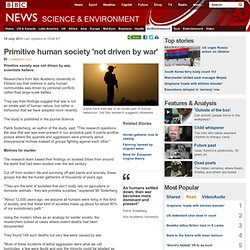
Researchers from Abo Academy University in Finland say that violence in early human communities was driven by personal conflicts rather than large-scale battles. They say their findings suggest that war is not an innate part of human nature, but rather a behaviour that we have adopted more recently. The study is published in the journal Science. Patrik Soderberg, an author of the study, said: "This research questions the idea that war was ever-present in our ancestral past. Survey of Earliest Human Settlements Undermines Claim That War Has Deep Evolutionary Roots.
My last two posts discuss two new studies that contradict the Deep Roots Theory of War, which holds that war is ancient and innate.
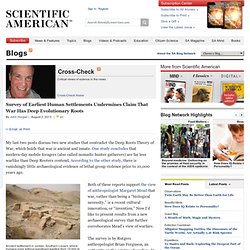
One study concludes that modern-day mobile foragers (also called nomadic hunter gatherers) are far less warlike than Deep Rooters contend. According to the other study, there is vanishingly little archaeological evidence of lethal group violence prior to 10,000 years ago. Ancient settlement in Jordan, Southern Levant, where humans lived without significant warfare from 15,000 to 5,500 years ago, according to new archaeological survey. Difference Between Socialism and Communism. Why I am no longer a Marxist 2. Chomsky on Lenin, Trotsky, Socialism & the Soviet Union.
The Zeitgeist Movement - A Libertarian Socialist Critique. An Anarchist FAQ. The Case Against Hierarchy. Government in the Future. Een lezing gegeven door Noam Chomsky in het Poetry Center in New York, 16 Feb. 1970, waarin hij de vier grote politieke ideologieën uiteen zet: (1) klassiek liberaal, (2) libertair socialisme, (3) staats-socialisme, (4) staats-kapitalisme.
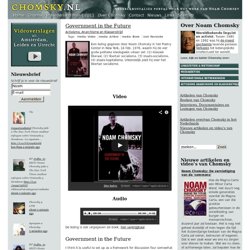
Uiteindelijk pleit hij voor het libertair socialisme. Video Audio De lezing is ook uitgegeven als boek, hier verkrijgbaar . Government in the Future. Jennifer Pahlka: Coding a better government. "Law Vs Ethics" Noam Chomsky. Evilness of Power.
Money on the Mind. Prisoner's Dilemma In Real Life. Chomsky on Human Desire for Freedom, Media Monopolies, & How We Can Resist. Marx's Theory of Alienation. Daniel H. Pink - To Sell is Human. Four Horsemen - deleted scene... The Pursuit of Profit. Dan Ariely: What makes us feel good about our work? Paul Piff: Does money make you mean? 'Money reduces trust' in small groups, study shows. 28 August 2013Last updated at 05:34 ET By Melissa Hogenboom Science reporter, BBC News People were more generous when there was no economic incentive A new study sheds light on how money affects human behaviour.

Exchanging goods for currency is an age old trusted system for trade. In large groups it fosters co-operation as each party has a measurable payoff. But within small groups a team found that introducing an incentive makes people less likely to share than they did before. The study is published in journal PNAS. When money becomes involved, group dynamics have been known to change. Gabriele Camera of Chapman University, US, who led the study, said that he wanted to investigate co-operation in large societies of strangers, where it is less likely for individuals to help others than in tight-knit communities. The team devised an experiment where subjects in small and large groups had the option to give gifts in exchange for tokens.
Social cost Continue reading the main story The study. HUMAN RESOURCES Social Engineering In The 20th Century HQ FULL.